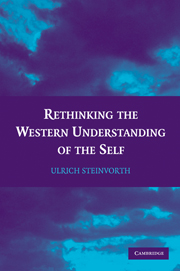Book contents
- Frontmatter
- Contents
- Preface
- Part I Introduction
- Part II Basics of Philosophical Psychology
- Part III The Cartesian Self in History
- Part IV Value Spheres
- Part V A Self-Understanding Not Only for the West
- Chapter 20 Is the Core Idea of Modernity Realizable At All?
- Chapter 21 Harnessing Extraordinariness
- Chapter 22 Cartesian Modernity
- Chapter 23 The Undivided, Universally Developed Individual
- Chapter 24 The End of History?
- Select Bibliography
- Index
Chapter 21 - Harnessing Extraordinariness
Published online by Cambridge University Press: 05 June 2012
- Frontmatter
- Contents
- Preface
- Part I Introduction
- Part II Basics of Philosophical Psychology
- Part III The Cartesian Self in History
- Part IV Value Spheres
- Part V A Self-Understanding Not Only for the West
- Chapter 20 Is the Core Idea of Modernity Realizable At All?
- Chapter 21 Harnessing Extraordinariness
- Chapter 22 Cartesian Modernity
- Chapter 23 The Undivided, Universally Developed Individual
- Chapter 24 The End of History?
- Select Bibliography
- Index
Summary
Value spheres are the social harness for turning an ambivalent into a creative power. Without value spheres, extraordinariness ends in destruction. Arendt implied this when she remarked: “One, if not the chief, reason for the incredible development of gift and genius in Athens, as well as for the hardly less surprising swift decline … was precisely that from beginning to end its foremost aim was to make the extraordinary an ordinary occurrence of everyday life.” The rise of gift and genius would not have been possible without conditions that unfettered the ambition of extraordinariness. But if such conditions are not accompanied by standards, a civilization will decline. Without standards to measure what is extraordinary, what is often done becomes ordinary and the ambition of extraordinariness is satisfied only by sensational and scandalous actions that end in destruction. Yet the standards are detected, learned, and transmitted in the value spheres.
Providing us with standards to discern the extraordinary from the sensational and the unusual is but one function of value spheres. Another and perhaps still more important one is to attract individuals to constructive activities by which they can enact their ambition. True, value spheres can only decrease the probability that extraordinariness is evil; they cannot guarantee that it is good. But we cannot expect more from creatures with free will. To understand how extraordinariness can be harnessed by value spheres, let us clarify what the kinds of extraordinariness are that need harnessing.
- Type
- Chapter
- Information
- Rethinking the Western Understanding of the Self , pp. 176 - 186Publisher: Cambridge University PressPrint publication year: 2009

